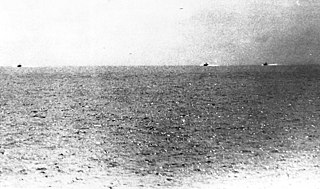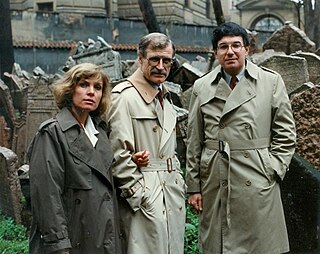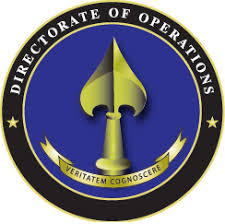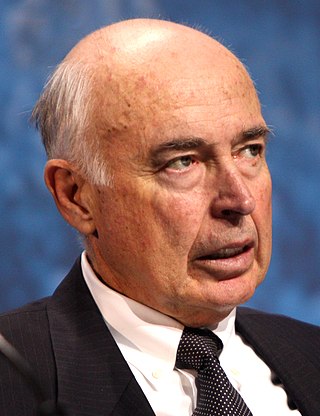Related Research Articles

The Lockheed U-2, nicknamed "Dragon Lady", is an American single-engine, high altitude reconnaissance aircraft operated from the 1950s by the United States Air Force (USAF) or the Central Intelligence Agency (CIA). It provides day and night, high-altitude, all-weather intelligence gathering.

The Gulf of Tonkin incident was an international confrontation that led to the United States engaging more directly in the Vietnam War. It involved both a proven confrontation on August 2, 1964, carried out by North Vietnamese forces in response to covert operations in the coastal region of the gulf, and a second, claimed confrontation on August 4, 1964, between North Vietnamese and United States ships in the waters of the Gulf of Tonkin. Originally American claims blamed North Vietnam for both attacks. Later investigation revealed that the second attack never happened; the American claim is that it was based mostly on erroneously interpreted communications intercepts.

Cold War espionage describes the intelligence gathering activities during the Cold War between the Western allies and the Eastern Bloc. Both relied on a wide variety of military and civilian agencies in this pursuit.

Stealth technology, also termed low observable technology, is a sub-discipline of military tactics and passive and active electronic countermeasures, which covers a range of methods used to make personnel, aircraft, ships, submarines, missiles, satellites, and ground vehicles less visible to radar, infrared, sonar and other detection methods. It corresponds to military camouflage for these parts of the electromagnetic spectrum.
Measurement and signature intelligence (MASINT) is a technical branch of intelligence gathering, which serves to detect, track, identify or describe the distinctive characteristics (signatures) of fixed or dynamic target sources. This often includes radar intelligence, acoustic intelligence, nuclear intelligence, and chemical and biological intelligence. MASINT is defined as scientific and technical intelligence derived from the analysis of data obtained from sensing instruments for the purpose of identifying any distinctive features associated with the source, emitter or sender, to facilitate the latter's measurement and identification.

William Hedgcock Webster is an American attorney and jurist who most recently served as chair of the Homeland Security Advisory Council from 2005 until 2020. He was a United States district judge of the United States District Court for the Eastern District of Missouri and a United States circuit judge of the United States Court of Appeals for the Eighth Circuit before becoming director of the Federal Bureau of Investigation (FBI) from 1978 to 1987 and director of Central Intelligence (CIA) from 1987 to 1991. He is the only person to have held both positions.

Norman (Norm) Ralph Augustine is a U.S. aerospace businessman who served as United States Under Secretary of the Army from 1975 to 1977. Augustine served as chairman and CEO of the Lockheed Martin Corporation. He was chairman of the Review of United States Human Space Flight Plans Committee.

The Lockheed A-12 is a high-altitude, Mach 3+ reconnaissance aircraft built for the United States Central Intelligence Agency (CIA) by Lockheed's Skunk Works, based on the designs of Clarence "Kelly" Johnson. The aircraft was designated A-12, the 12th in a series of internal design efforts for "Archangel", the aircraft's internal code name. In 1959, it was selected over Convair's FISH and Kingfish designs as the winner of Project GUSTO, and was developed and operated under Project Oxcart.

Karl František Koecher is a Czech mole known to have penetrated the CIA during the Cold War.

Ronald Anthony MarksFRSA is a former senior Central Intelligence Agency official and Capitol Hill Staffer. He is currently Chairman and CEO of ZPN Cyber and National Security Strategies and an academic focused on Cyber and Intelligence policy issues. His book "Spying in America in the Post 9/11 World: Domestic Threat and the Need for Change," published by Praeger Publishing, focuses on the vast expansion of intelligence collection in America and the need for careful oversight.

The Directorate of Operations (DO), less formally called the Clandestine Service, is a component of the US Central Intelligence Agency. It was known as the Directorate of Plans from 1951 to 1973; as the Directorate of Operations from 1973 to 2005; and as the National Clandestine Service (NCS) from 2005 to 2015.

The Institute of World Politics (IWP) is a private graduate school of national security, intelligence, and international affairs in Washington, D.C., and Reston, Virginia. Founded in 1990, the school offers courses related to intelligence, national security, and diplomatic communities.

Dino Antonio Brugioni was a former senior official at the CIA's National Photographic Interpretation Center (NPIC). He was an imagery analyst and also served as NPIC's Chief of Information. During his 35-year career, Brugioni helped establish imagery intelligence (IMINT) as a national asset to solve intelligence problems. Even after retirement, Brugioni was considered to be the world's foremost imagery intelligence analyst.

The Schar School of Policy and Government (SSPG), formerly known as the George Mason University School of Policy, Government, and International Affairs (SPGIA), is the public policy school of George Mason University headquartered in Arlington, Virginia roughly 4 miles (6.4 km) west of Washington, D.C., with a satellite campus in suburban Fairfax County, Virginia. Established as Northern Virginia's first public policy school, the constituent college offers bachelor's-level undergraduate as well as postgraduate degrees in political science and its specific sub-fields such as international relations, public policy, public administration, international security, and urban studies along with specialized postgraduate education through graduate certificates, master's, and doctoral degree programs in fields such as biodefense, international commerce, homeland security, emergency management, counterterrorism, illicit trade analysis, organization development, and knowledge management as well as executive education programs with students eventually choosing one or two degree programs to join, but having the option of taking elective courses from across several sub-fields at both the undergraduate and postgraduate levels. While it primarily educates and conducts research in subjects related to politics, government, international affairs, and public policy-related economics, as well as the study of regional issues affecting the Washington D.C. metropolitan area, the school is home to several prominent education programs (courses), centers, research institutes, and think tanks dealing with security studies, counterterrorism, transportation policy, nonprofit management, energy, infrastructure, and the environment including the Michael V. Hayden Center for Intelligence, Policy, and International Security, the Center for Security Policy Studies, Center for Transportation Public-Private Partnership Policy, Center on Nonprofits, Philanthropy, and Social Enterprise, the Terrorism, Transnational Crime and Corruption Center (TraCCC), and the Center for Energy Science and Policy; the School of Policy and Government also cooperates with the Antonin Scalia Law School’s National Security Institute in conducting research around legal issues pertaining to national security. The school is also the psephology partner of The Washington Post, collaborating on electoral polling and analysis for the paper since 2016, the two hold an A+ rating for historical accuracy and methodology in polling from FiveThirtyEight.

The Directorate of Science & Technology (DS&T) is the branch of the United States Central Intelligence Agency (CIA) tasked with collecting and analyzing information through technological means and develop technical systems in order to advance the CIA’s intelligence gathering.

Robert James Woolsey Jr. is an American political appointee who has served in various senior positions. He headed the Central Intelligence Agency as Director of Central Intelligence from February 5, 1993, until January 10, 1995. He held a variety of government positions in the 1970s and 1980s, including as United States Under Secretary of the Navy from 1977 to 1979, and was involved in treaty negotiations with the Soviet Union for five years in the 1980s. His career also included time as a professional lawyer, venture capitalist and investor in the private sector.

The Bush School of Government and Public Service is an undergraduate and graduate college of Texas A&M University founded in 1997 under former US President George H. W. Bush's philosophy that "public service is a noble calling." Since then, the Bush School has continued to reflect that notion in curriculum, research, and student experience and has become a leading international affairs, political science, and public affairs institution.

Angelo Maria Codevilla was an Italian-American professor of international relations at what is now the Pardee School of Global Studies at Boston University. He served as a U.S. Navy officer, a foreign service officer, and professional staff member of the Select Committee on Intelligence of the United States Senate. Codevilla's books and articles range from French and Italian politics to the thoughts of Machiavelli and Montesquieu to arms control, war, the technology of ballistic missile defenses, and a broad range of international topics. Articles by Codevilla have appeared in Commentary, Foreign Affairs, National Review, and The New Republic. His op-eds have appeared in The New York Times, The Wall Street Journal, The American Spectator and The Washington Post. He has also been published in Political Science Reviewer, Intercollegiate Review, and Politica.
David Wise was an American journalist and author who worked for the New York Herald-Tribune in the 1950s and 1960s, and published a series of non-fiction books on espionage and US politics as well as several spy novels. His book The Politics of Lying: Government Deception, Secrecy, and Power (1973) won the George Polk Award, and the George Orwell Award (1975).

Project AQUILINE was a secret 1960s CIA program to develop an unmanned aerial reconnaissance vehicle.
References
- ↑ S. Eugene Poteat, Biography, Center for Counterintelligence and Security Studies
- ↑ Awards and decorations of the United States government
- ↑ FAS Factbook: CIA Medals
- ↑ S. Eugene Poteat, "Engineering in the CIA: ELINT, Stealth and the Beginnings of Information Warfare", The Bent of Tau Beta Pi, Fall 1999
- ↑ Gene Poteat, Stealth, Countermeasures, and ELINT, 1960-1975
- ↑ S. Eugene Poteat, "Intelligence analysis paralysis", AFIO Periscope Newsletter, 2005, pages 3-6
- ↑ Intelligencer Journal Cover Themes
- ↑ S. Eugene Poteat, "HUMINT, SIGINT, and now GEOINT", Intelligencer Journal, Fall/Winter 2013, p.3-4
- ↑ S. Eugene Poteat, "Too Big To Keep Secrets? Not Too Big to Fail If We Don't", Intelligencer Journal, Spring/Summer 2013, p.3-4
- ↑ S. Eugene Poteat, ""Scientific and Technical Intelligence: A Memoir by a S&T Intelligence Officer", Guide to the Study of Intelligence, Intelligencer Journal, Forthcoming 2015
- ↑ Michelle Delio, "A peek inside the secret world", 10 November 2003
- ↑ Jeffrey T. Richelson, "The Wizards of Langley: Inside the CIA's Directorate of Science and Technology", Westview Press (July 2001), 386 pages, ISBN 978-0-8133-6699-9
- ↑ S. Eugene Poteat, "George Washington: Spymaster Extraordinare", February 2000
- ↑ In Memoriam: S. Eugene Poteat, CIA officer, IWP Alumnus, and Professor